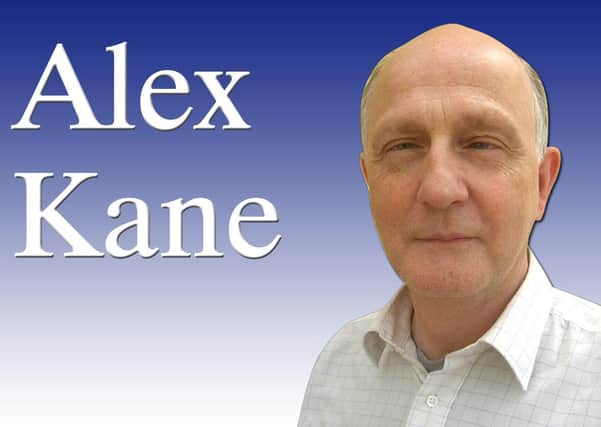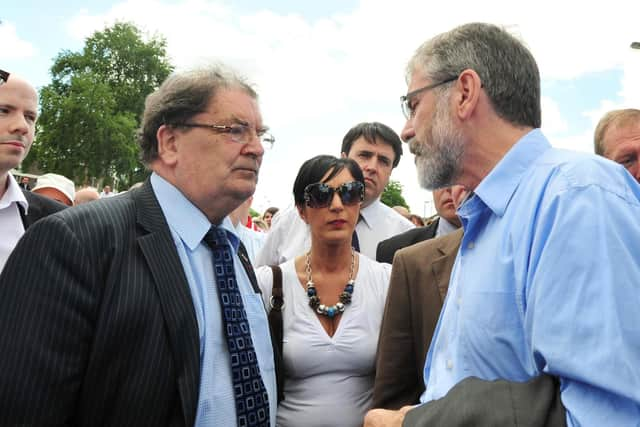Alex Kane: Hume and Adams gave unionism a lesson in getting a message across


John Hume was deputy leader/leader of the SDLP (of which he was a founding member) from 1970 to 2001.
He put Irish nationalism on the national and international stage in a way that many taoisigh had failed to do. He took his infamous ‘single-transferable speech’ to London and Washington (and much further afield if the invitations came), as well as to Brussels and Strasbourg when he was first elected to the European Parliament in 1979.
Advertisement
Hide AdAdvertisement
Hide AdIn July 1972 Gerry Adams (interned on HMS Maidstone at the time) was released, at the IRA’s insistence, to take part in secret negotiations between the IRA and British government.


It took another decade or so before he had taken complete control of the ‘machine’ (becoming SF’s president in 1983), but from 1972 he was regarded as the key figure in modern republicanism.
Both men were the constants of nationalist/republican politics for over 30 years.
It didn’t matter which of their colleagues joined them at meetings with governments, at conferences, at off-the-record internal discussions, or around negotiating tables, they were the most important people in the room. What they said was what mattered most, because what they said was underpinned by their personal authority and by the trust placed in them by their party colleagues.
Advertisement
Hide AdAdvertisement
Hide AdThis mattered. When governments and assorted intermediaries (during the time nobody was ‘officially’ talking to SF/IRA) spoke to the SDLP and SF they heard a clear, ready to be negotiated, strategic overview from the parties. That’s why so much SDLP thinking found its way into the Anglo-Irish Agreement. It’s why SF’s thinking can also be seen in 1993’s Downing Street Declaration and the later Framework Documents in 1995.
Party-political nationalism and republicanism – which had been quite far apart on key issues in the 1970s and for most of the 80s – began to work more in harness, ensuring their separate, sometimes contradictory policies were known to and discussed by strategists in London, Dublin, Washington and Brussels; as well as to a lesser extent in the NIO which, for most of the 70s and 80s wasn’t regarded as a ‘friend’ of nationalism.
But while nationalism and republicanism were under the control of Hume and Adams for most of those 30 critical years from 1970 to 2000, it was a completely different story on the unionist/loyalist side. Ian Paisley was DUP leader for the entire time but saw his own role – and that of his party – as that of official opposition to the UUP. Indeed, there were moments when his anger and ranting suggested he saw successive leaders of the UUP as a greater threat to the Union than the civil rights movement, SDLP or IRA.
A former NIO minister told me he found Paisley incredibly difficult to fathom: “I really didn’t know what he wanted from us. Sometimes it sounded as though he was just making up policy as he sat across the table. Robinson was much cannier – but only when Paisley wasn’t in the room at the same time.” Yet it was probably that canniness – which has been recognised and acknowledged by many who dealt with him over the decades – which ensured the Assembly survived after the DUP and SF eclipsed the UUP and SDLP in the 2003 Assembly elections.
Advertisement
Hide AdAdvertisement
Hide AdBut the UUP leadership of Chichester-Clark (who succeeded Terence O’Neill in 1970), Faulkner, West, Molyneaux and Trimble wasn’t accompanied by consistency of either message or policy. I think it was former secretary of state Roy Mason (1976-1979) who said that talking to a UUP delegation was a bit like talking to three parties at the same time. I have heard similar comments from other Irish and UK government figures down the years; including one who described David Trimble’s post-1998 dilemma as “being in the unfortunate position of leading the weaker, albeit larger, wing of the UUP.”
This difference in approach between unionism and nationalism in the 1972-1998 period (in particular), played out to SDLP/SF advantage. Key players in UK/Ireland/European/US governments and lobby groups knew precisely what the message from nationalism and republicanism was. They knew what support they were being asked to give, as well as how best it could be given.
Meanwhile, unionism, either collectively or singly, was very poor at spreading its wings and its message. Its version of Northern Ireland wasn’t heard much outside of here.
It wasn’t so much a case of nationalism and republicanism ‘rewriting history’ as of unionism making a very poor fist of countering the message and history of their political opponents. In the last few days I’ve seen a Twitter thread arguing that unionists needed to get their act together and start writing the ‘truth’ to counter SF’s narrative. Hmm. I remember writing something like that about 30 years ago.
Advertisement
Hide AdAdvertisement
Hide AdThe problem of mixed messaging, or no messaging at all, continues to dog unionism’s heels. Two-thirds of the way through NI’s centenary and we’re hardly knee-deep in books, documentaries or online exhibitions and conferences written and produced from a unionist/pro-Union perspective.
Again, another moment to tell our own story seems to have been lost in other issues, not least the protocol crisis and renewed fears of betrayal by a British government.
——— ———
A message from the Editor:
Thank you for reading this story on our website. While I have your attention, I also have an important request to make of you.
With the coronavirus lockdown having a major impact on many of our advertisers — and consequently the revenue we receive — we are more reliant than ever on you taking out a digital subscription.
Advertisement
Hide AdAdvertisement
Hide AdSubscribe to newsletter.co.uk and enjoy unlimited access to the best Northern Ireland and UK news and information online and on our app. With a digital subscription, you can read more than 5 articles, see fewer ads, enjoy faster load times, and get access to exclusive newsletters and content. Visit https://www.newsletter.co.uk/subscriptions now to sign up.
Our journalism costs money and we rely on advertising, print and digital revenues to help to support them. By supporting us, we are able to support you in providing trusted, fact-checked content for this website.
Ben Lowry
Acting Editor